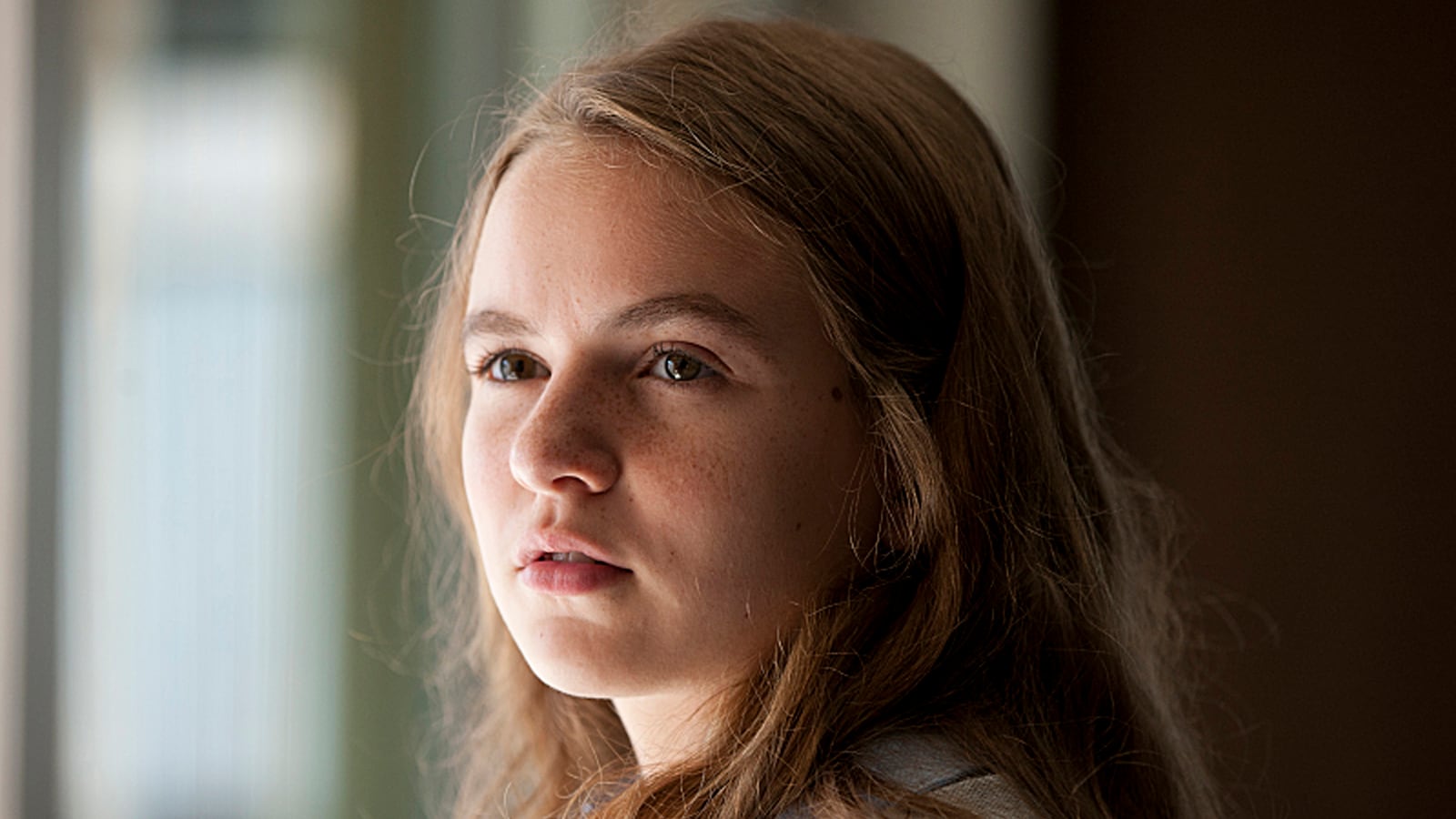Now that Breaking Bad’s Skyler White is gone—she’s probably still curled up in that dusty basement apartment, a cigarette in one hand and a glass of cab in the other—Morgan Saylor, who plays Sgt. Nicholas Brody’s angsty teenage daughter Dana on Homeland, has surpassed Anna Gunn as the television star who catches the most flak from the Internet.

There was the post mocking “Dana Brody face”: “an impenetrable piece of fleshy armor, signifying that everything, like, totally sucks.” There was the listicle with 13,000 Facebook likes “explaining” why “Dana Brody is the worst.” And there were even a few single-minded hate sites dedicated to exploring such topics as “If I were Dana Brody from Homeland, I would have every reason to decapitate myself” and “I think we can all agree that Dana Brody should be blown up.”
But you know what? The haters are just as wrong about Saylor, 18, as they were about Gunn. Is Dana irritating sometimes? Sure. But that’s because teenagers are irritating sometimes, as anyone who has ever been or met a teenager knows firsthand. Saylor is just doing her job. In fact, she’s doing it exceedingly well. For my money, Dana Brody is the most lifelike teenager character on television since Freaks and Geeks was canceled 13 years ago.
That’s especially true in Season 3. In the premiere episode, Saylor’s character stripped down and sent a selfie to her new flame, Leo; in the second installment, which aired Sunday night, she and Leo had sex on the floor of the rehab center where they first met. Throughout, Saylor has captured with uncommon sensitivity and subtleness Dana’s struggle to return to the “real world” after the twinned traumas of finding out her father was a terrorist and attempting suicide as a result. One second she’s raging at her mother for walking on eggshells around her, the next she’s cracking a joke and trying to restore the peace. Now Dana feels realer than ever.
I recently spoke to Saylor about whether all the slings and arrows make her self-conscious—and how she channels her own post-adolescent alienation into her character. Excerpts from our conversation:
I want to ask a little bit about how Dana has been received by audiences. What was your reaction when you saw the Saturday Night Live parody?
[Laughs] I thought it was funny. And just an hour ago I saw the thing The Simpsons did about Homerland, which was funny as well. It’s so weird that our little show has become something that people spoof, that such great, respectable, legitimate shows like SNL have created something out of it.
I wonder what that’s like for you as an actor—to see how someone parodies your performance. Does it make you self-conscious?
Yeah, kind of. [Laughs] SNL made a big deal of my hands and my fingers—I mess with my sleeves or something. Which I’ve never even thought about. But I do do that, playing Dana. And now I notice, and now I’m self-conscious about it. It is like a caricature. But I guess it’s better that it’s not me, Morgan. It’s Dana.
The hands totally work for Dana, so don’t second-guess yourself too much.
[Laughs]
Serious question now: why has Dana provoked such mixed reactions among viewers?
Anna Gunn wrote that op-ed for The New York Times about Skyler White. I kind of wanted to comment on it and be like, “Yeah, I know how you feel.” But characters are not always supposed to be loved. You could look at most characters and see mixed reactions. I don’t know. I don’t take it personally. I think it’s kind of interesting to see people, like, spending so much time focusing on something like that.
Do you agree ...
What? That Dana’s a bitch? [Laughs]
No! Do you agree with Anna Gunn’s point that there’s a double standard for women characters—that viewers wouldn’t react to a similar male character the same way?
Hmmm. I don’t know. I don’t know completely if it’s a sexism thing. I think a lot of characters get a lot of shit. Maybe women more than men, but ... I’m not that offended by it. And therefore it’s not that big of a deal.
I think your portrayal is one of the great teen angst roles on TV today. You’re pretty close in age to Dana. Do you draw from your own experience to capture her anger and frustration?
Yeah, I’d say so. It never has been completely clear, but I think she was 16 when the show started, and I was 16, so I could relate in a teenager-y, angsty sort of way—like feeling alienated from my family. Not anything superdramatic. I love both of my parents. But yeah, I related to the feeling of being annoyed with the world around you.
I think I’ve grown up more than Dana has, though, because more time has passed in real life than on the show.
She seems younger than you?
Yeah. I think so. It feels like I’m younger when I watch myself now.
When did you first learn that Dana tried to commit suicide between Seasons 2 and 3? What was your reaction?
Actually, Claire [Danes] told me that. I hadn’t read the scripts yet, and I saw Claire before we started filming. I was kind of devastated. We spend so much of the hiatus wondering what is happening to these people we portray, and it was heartbreaking to learn that Dana had done that. But also fitting, and exciting to know that there would be something to explore and play.
Dana has become such a central part of the show. Why do you think that happened? We barely ever hear her brother Chris speak, and yet Dana has her own narrative in every episode.
I had no idea that it would grow to be this role, especially during the audition. I don’t think the role was meant to be this big.
Why did that change?
I think Damian [Lewis] and I had a natural chemistry that stood out when we began acting together. But also I think a big part of it is that a majority of the writers—we have six writers—have a daughter or son who is my age. That’s a fact. Five out of six have kids who were 16 when we started and who are now 18 or 19. I think they like to be able to pull from that, especially because most of the writers are male and they get to write about that father-daughter relationship. Certain writers would even talk about how certain scenes remind them of their kids.
Has there ever been a moment when you said, “You know what? This line doesn’t quite feel right. I’m 17; you’re 45. Maybe we should change it.”
Some writers are more particular about the writing, and you sort of learn that after working with them for so long—you learn who not to fight with over a line. And some are more open. But there are definitely things that ... I don’t know if I would even ask. There are lines I would just change in rehearsal. And they’ll say, “Why did you do that?” And I’ll say, “Well, it really doesn’t roll off my tongue.” And they’ll say, “OK. Make it accurate and make it teenager-y.” So that’s what I do.
What’s an example?
My interactions with Jackson [Pace], who plays my brother. The rudish nicknames that I’ve called him. A lot of Dana lines that are uniquely something a teenager would say. When I first met Finn in the library in the beginning of the second season, I said something about The Walking Dead. And at first it just did not sound right at all, so I spoke up and they were like, “Oh yeah. What 16-year-old would say that? It doesn’t make sense.” So we changed the way it was structured.
Now that Brody is on the run, how would you describe Dana’s relationship with her father? There’s that moving scene in the second episode, where Dana takes out the prayer mat and looks at the old photos, even though she was just saying that Brody had ruined her life ...
That’s always a hard question. It’s weird. She definitely doesn’t respect him or want to become Muslim. But maybe it’s a way of saying goodbye. She’s looking at those pictures and kind of stumbles upon the mat, and then she definitely does something that she only knows because of him—she lays down like she’s praying. I think it’s a way of saying goodbye.
A way of letting go.
Yeah.
Dana’s been getting fairly frisky this season, snapping scandalous selfies in Episode 1 and having sex with Leo in Episode 2. Why is she so gung-ho about this guy?
We know that Dana is unstable, just based on her having tried to kill herself. She argues that she wants to be with Leo because he understands her. And I think that’s a big part of it. She doesn’t feel like she can talk to her family or the doctors at rehab. And while Leo is a little reckless and also unstable, he’s someone she can be distracted by. With him she doesn’t have to be miserable all the time. She doesn’t have to have the weight of Brody hanging over the relationship.
What can you say about Dana’s arc going forward? What’s next for her?
I just finished my last episode, and it’s intense. This season is really intense for Dana. But it felt good. It really does feel like she’s grown up a lot in the past three seasons, whether it’s with her family or with herself and the relationships around her.
Is it fair to say that in that scene where she’s saying goodbye to Brody isn’t actually a goodbye, that we’ll see them together again?
I ... can’t say that.
Fair enough. You’re working with some fantastic actors—Claire Danes, Mandy Patinkin, Damian Lewis. Have you learned anything from watching them act up close?
I’ve learned a lot. The person I’ve worked with most is Morena Baccarin, and from her I’ve learned to stand up for your character. Because she fights for Jessica: about lines, about scenes. And that’s really cool to see, because she respects her character. She doesn’t care what the audience thinks, but she likes the integrity of her character and the depth of her character. She wants to watch out for that.
Can you give me an example of when you and she stood up for your characters?
For example, in the second episode of this season, when I’m saying, “Dad was psycho, he ruined our lives” in that big bathroom scene, originally I think Morena said, “No, no”—she was kind of defeated. But we talked about it and said, “I don’t think Jessica would say that, because she’s strong and she knows that he’s done bad things.” So her line changed to “your father was a lot of things.” That’s just one small example.
If you were asked to write an op-ed in The New York Times, what would you say to the viewers who have trash-talked Dana?
“Good.” I think it’s cool to provoke something in people.
What do you want to provoke?
Dana’s story is different than most of Homeland, and I know that. But it shows the effect Brody’s actions have on his family. And I also think it’s important to give viewers a break. Homeland is intense, and I think it would be a hard show to watch if it were intense for 60 straight minutes.
The good news is that Anna Gunn just won the Emmy, so you’re next.
[Laughs]






